#GOOGLE
Text
The specific process by which Google enshittified its search
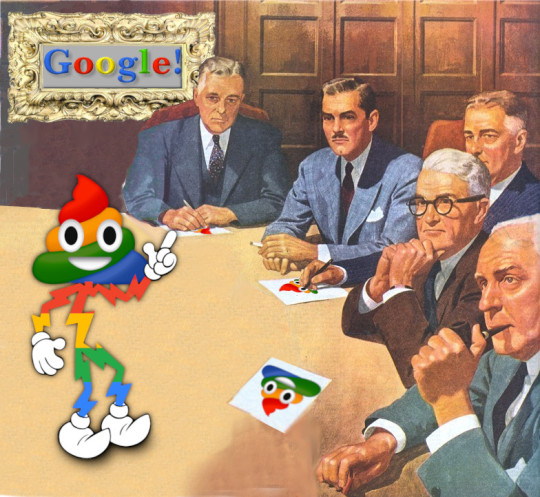
I'm touring my new, nationally bestselling novel The Bezzle! Catch me SATURDAY (Apr 27) in MARIN COUNTY, then Winnipeg (May 2), Calgary (May 3), Vancouver (May 4), and beyond!

All digital businesses have the technical capacity to enshittify: the ability to change the underlying functions of the business from moment to moment and user to user, allowing for the rapid transfer of value between business customers, end users and shareholders:
https://pluralistic.net/2023/02/19/twiddler/
If you'd like an essay-formatted version of this thread to read or share, here's a link to it on pluralistic.net, my surveillance-free, ad-free, tracker-free blog:
https://pluralistic.net/2024/04/24/naming-names/#prabhakar-raghavan
Which raises an important question: why do companies enshittify at a specific moment, after refraining from enshittifying before? After all, a company always has the potential to benefit by treating its business customers and end users worse, by giving them a worse deal. If you charge more for your product and pay your suppliers less, that leaves more money on the table for your investors.
Of course, it's not that simple. While cheating, price-gouging, and degrading your product can produce gains, these tactics also threaten losses. You might lose customers to a rival, or get punished by a regulator, or face mass resignations from your employees who really believe in your product.
Companies choose not to enshittify their products…until they choose to do so. One theory to explain this is that companies are engaged in a process of continuous assessment, gathering data about their competitive risks, their regulators' mettle, their employees' boldness. When these assessments indicate that the conditions are favorable to enshittification, the CEO walks over to the big "enshittification" lever on the wall and yanks it all the way to MAX.
Some companies have certainly done this – and paid the price. Think of Myspace or Yahoo: companies that made themselves worse by reducing quality and gouging on price (be it measured in dollars or attention – that is, ads) before sinking into obscure senescence. These companies made a bet that they could get richer while getting worse, and they were wrong, and they lost out.
But this model doesn't explain the Great Enshittening, in which all the tech companies are enshittifying at the same time. Maybe all these companies are subscribing to the same business newsletter (or, more likely, buying advice from the same management consultancy) (cough McKinsey cough) that is a kind of industry-wide starter pistol for enshittification.
I think it's something else. I think the main job of a CEO is to show up for work every morning and yank on the enshittification lever as hard as you can, in hopes that you can eke out some incremental gains in your company's cost-basis and/or income by shifting value away from your suppliers and customers to yourself.
We get good digital services when the enshittification lever doesn't budge – when it is constrained: by competition, by regulation, by interoperable mods and hacks that undo enshittification (like alternative clients and ad-blockers) and by workers who have bargaining power thanks to a tight labor market or a powerful union:
https://pluralistic.net/2023/11/09/lead-me-not-into-temptation/#chamberlain
When Google ordered its staff to build a secret Chinese search engine that would censor search results and rat out dissidents to the Chinese secret police, googlers revolted and refused, and the project died:
https://en.wikipedia.org/wiki/Dragonfly_(search_engine)
When Google tried to win a US government contract to build AI for drones used to target and murder civilians far from the battlefield, googlers revolted and refused, and the project died:
https://www.nytimes.com/2018/06/01/technology/google-pentagon-project-maven.html
What's happened since – what's behind all the tech companies enshittifying all at once – is that tech worker power has been smashed, especially at Google, where 12,000 workers were fired just months after a $80b stock buyback that would have paid their wages for the next 27 years. Likewise, competition has receded from tech bosses' worries, thanks to lax antitrust enforcement that saw most credible competitors merged into behemoths, or neutralized with predatory pricing schemes. Lax enforcement of other policies – privacy, labor and consumer protection – loosened up the enshittification lever even more. And the expansion of IP rights, which criminalize most kinds of reverse engineering and aftermarket modification, means that interoperability no longer applies friction to the enshittification lever.
Now that every tech boss has an enshittification lever that moves very freely, they can show up for work, yank the enshittification lever, and it goes all the way to MAX. When googlers protested the company's complicity in the genocide in Gaza, Google didn't kill the project – it mass-fired the workers:
https://medium.com/@notechforapartheid/statement-from-google-workers-with-the-no-tech-for-apartheid-campaign-on-googles-indiscriminate-28ba4c9b7ce8
Enshittification is a macroeconomic phenomenon, determined by the regulatory environment for competition, privacy, labor, consumer protection and IP. But enshittification is also a microeconomic phenomenon, the result of innumerable boardroom and product-planning fights within companies in which would-be enshittifiers try to do things that make the company's products and services shittier wrestle with rivals who want to keep things as they are, or make them better, whether out of principle or fear of the consequences.
Those microeconomic wrestling-matches are where we find enshittification's heroes and villains – the people who fight for the user or stand up for a fair deal, versus the people who want to cheat and wreck to make things better for the company and win bonuses and promotions for themselves:
https://locusmag.com/2023/11/commentary-by-cory-doctorow-dont-be-evil/
These microeconomic struggles are usually obscure, because companies are secretive institutions and our glimpses into their deliberations are normally limited to the odd leaked memo, whistleblower tell-all, or spectacular worker revolt. But when a company gets dragged into court, a new window opens into the company's internal operations. That's especially true when the plaintiff is the US government.
Which brings me back to Google, the poster-child for enshittification, a company that revolutionized the internet a quarter of a century ago with a search-engine that was so good that it felt like magic, which has decayed so badly and so rapidly that whole sections of the internet are disappearing from view for the 90% of users who rely on the search engine as their gateway to the internet.
Google is being sued by the DOJ's Antitrust Division, and that means we are getting a very deep look into the company, as its internal emails and memos come to light:
https://pluralistic.net/2023/10/03/not-feeling-lucky/#fundamental-laws-of-economics
Google is a tech company, and tech companies have literary cultures – they run on email and other forms of written communication, even for casual speech, which is more likely to take place in a chat program than at a water-cooler. This means that tech companies have giant databases full of confessions to every crime they've ever committed:
https://pluralistic.net/2023/09/03/big-tech-cant-stop-telling-on-itself/
Large pieces of Google's database-of-crimes are now on display – so much, in fact, that it's hard for anyone to parse through it all and understand what it means. But some people are trying, and coming up with gold. One of those successful prospectors is Ed Zitron, who has produced a staggering account of the precise moment at which Google search tipped over into enshittification, which names the executives at the very heart of the rot:
https://www.wheresyoured.at/the-men-who-killed-google/
Zitron tells the story of a boardroom struggle over search quality, in which Ben Gomes – a long-tenured googler who helped define the company during its best years – lost a fight with Prabhakar Raghavan, a computer scientist turned manager whose tactic for increasing the number of search queries (and thus the number of ads the company could show to searchers) was to decrease the quality of search. That way, searchers would have to spend more time on Google before they found what they were looking for.
Zitron contrasts the background of these two figures. Gomes, the hero, worked at Google for 19 years, solving fantastically hard technical scaling problems and eventually becoming the company's "search czar." Raghavan, the villain, "failed upwards" through his career, including a stint as Yahoo's head of search from 2005-12, a presiding over the collapse of Yahoo's search business. Under Raghavan's leadership, Yahoo's search market-share fell from 30.4% to 14%, and in the end, Yahoo jettisoned its search altogether and replaced it with Bing.
For Zitron, the memos show how Raghavan engineered the ouster of Gomes, with help from the company CEO, the ex-McKinseyite Sundar Pichai. It was a triumph for enshittification, a deliberate decision to make the product worse in order to make it more profitable, under the (correct) belief that the company's exclusivity deals to provide search everywhere from Iphones and Samsungs to Mozilla would mean that the business would face no consequences for doing so.
It a picture of a company that isn't just too big to fail – it's (as FTC Chair Lina Khan put it on The Daily Show) too big to care:
https://www.youtube.com/watch?v=oaDTiWaYfcM
Zitron's done excellent sleuthing through the court exhibits here, and his writeup is incandescently brilliant. But there's one point I quibble with him on. Zitron writes that "It’s because the people running the tech industry are no longer those that built it."
I think that gets it backwards. I think that there were always enshittifiers in the C-suites of these companies. When Page and Brin brought in the war criminal Eric Schmidt to run the company, he surely started every day with a ritual, ferocious tug at that enshittification lever. The difference wasn't who was in the C-suite – the difference was how freely the lever moved.
On Saturday, I wrote:
The platforms used to treat us well and now treat us badly. That's not because they were setting a patient trap, luring us in with good treatment in the expectation of locking us in and turning on us. Tech bosses do not have the executive function to lie in wait for years and years.
https://pluralistic.net/2024/04/22/kargo-kult-kaptialism/#dont-buy-it
Someone on Hacker News called that "silly," adding that "tech bosses do in fact have the executive function to lie in wait for years and years. That's literally the business model of most startups":
https://news.ycombinator.com/item?id=40114339
That's not quite right, though. The business-model of the startup is to yank on the enshittification lever every day. Tech bosses don't lie in wait for the perfect moment to claw away all the value from their employees, users, business customers, and suppliers – they're always trying to get that value. It's only when they become too big to care that they succeed. That's the definition of being too big to care.
In antitrust circles, they sometimes say that "the process is the punishment." No matter what happens to the DOJ's case against Google, its internal workers have been made visible to the public. The secrecy surrounding the Google trial when it was underway meant that a lot of this stuff flew under the radar when it first appeared. But as Zitron's work shows, there is plenty of treasure to be found in that trove of documents that is now permanently in the public domain.
When future scholars study the enshittocene, they will look to accounts like Zitron's to mark the turning points from the old, good internet to the enshitternet. Let's hope those future scholars have a new, good internet on which to publish their findings.

If you'd like an essay-formatted version of this post to read or share, here's a link to it on pluralistic.net, my surveillance-free, ad-free, tracker-free blog:
https://pluralistic.net/2024/04/24/naming-names/#prabhakar-raghavan
#pluralistic#ed zitron#google#microincentives#constraints#enshittification#rot economy#platform decay#search#ben gomes#code yellow#mckinsey#hacking engagement#Prabhakar Raghavan#yahoo#doj#antitrust#trustbusting
444 notes
·
View notes
Text
https://allison-348.suduso.com.cn/r/GcTAKfM
#metal music#breakfast#mensfashion#jinsoul#google#narusasu#sims 4 custom content#doom metal#black excellence#kipo and the age of wonderbeasts
124 notes
·
View notes
Text
I keep thinking Tumblr has run out of losers who think I'm funny but you guys keep coming. What is wrong with you all
58 notes
·
View notes
Text
https://christina-789.szhdyy.com.cn/o/SdHa8gs
#denver spun#metal music#breakfast#enderman#mensfashion#vegaspete#jinsoul#seven deadly sins#weasley twins#jongin#google#lawblr#narusasu#creepycore#sims 4 custom content
120 notes
·
View notes
Text
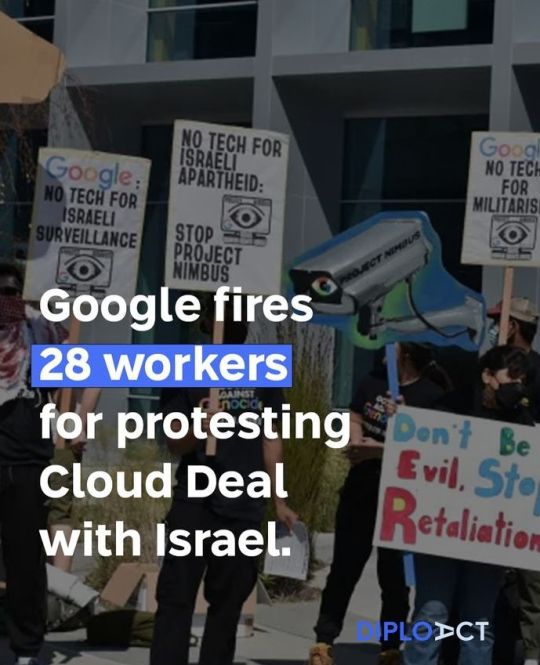

Love it . "Hit the road Jack and dontcha come back no more " lol
Give those Jobs to people who actually want to work and not sit on their butts protesting for terrorists !
#google#thank you google#israel#palestine#pro zionist#pro israel#lazy Anti semitic workers#i stand with israel#jumblr#stand with israel#antisemitism#i support israel
42 notes
·
View notes
Text
hello google chrome refugees
don't use any of these browsers, they're also chrome

Here are my favorite firefox plugins for security/anti-tracking/anti-ad that I recommend you get
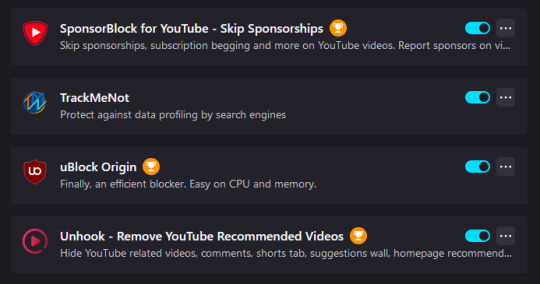
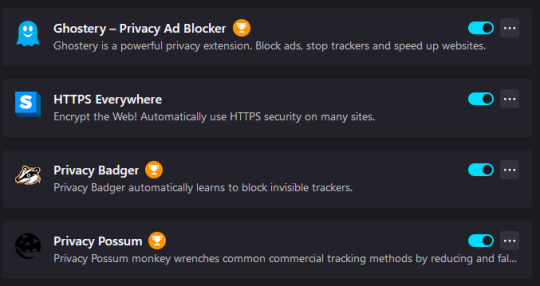
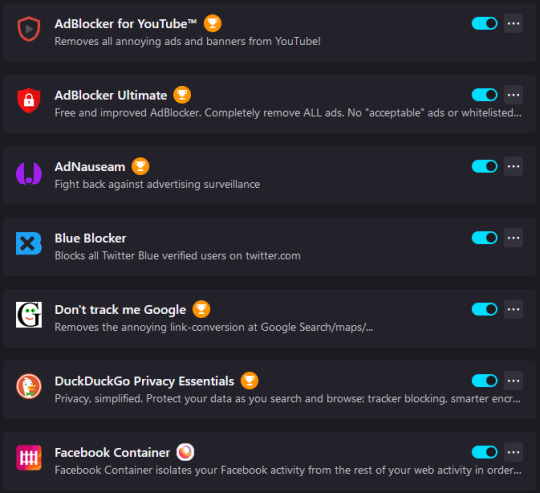
please get off chrome google is currently being investigated for being an Illegal Monopoly so get outta there okay love you bye
132K notes
·
View notes
Text
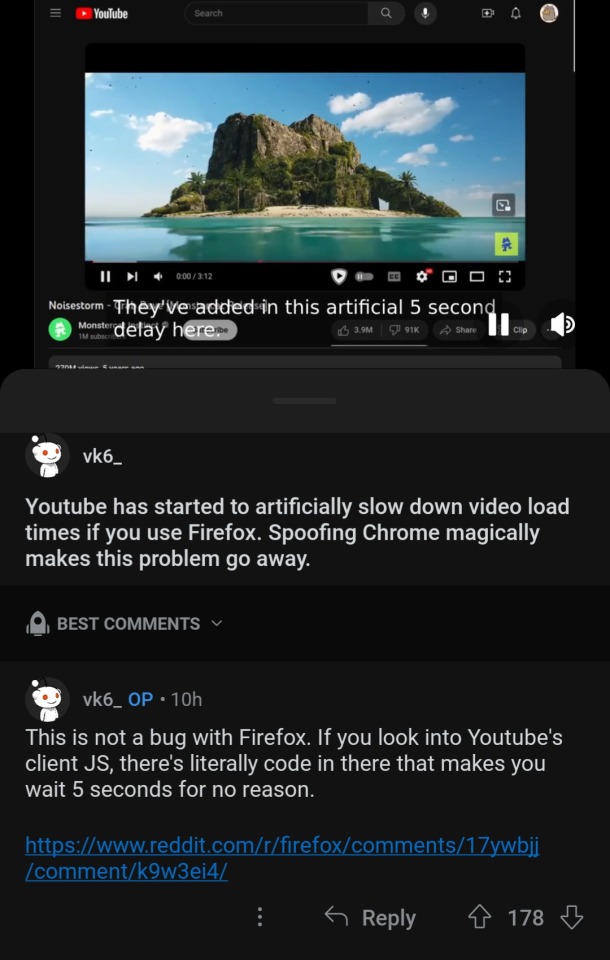
I haven't personally verified this as I'm not at a computer, but multiple people in multiple places are saying the same thing. This is fucking insane. First the endless war on UBlock, then the Chromium changes to shut out some blocker functionalities entirely next year, now this?
Something is deeply rotten in recent Google/YouTube policy. I can't imagine that this is legal - how is this not anticompetitive? Google needs to get mega fucked in the press and the courts sooner rather than later.
And I need to switch to Firefox as soon as I get home.
91K notes
·
View notes
Text
DON'T LET THIS GO OUT OF CIRCULATION. ADD MORE ONTO IT. QUEUE IT. DON'T LET THIS SITE FUCKING FORGET. THIS TRIAL COULD HAVE MASSIVE CONSEQUENCES FOR THE WHOLE INTERNET.
EDIT:
Originally I linked an MSN article. I was unaware they're not a trustworthy source, but many lovely people in the notes pointed it out and pointed out that the article I linked had issues, linking much better sources.
Here's an excellent addition to the post by @/thesoulofthebeautiful:
Also, I saw a lot of people freaking out in the notes like "Oh shit, is Google gonna get completely taken down????" No. It won't. Google's a trillion dollar company, this won't completely destroy it. What it'll hopefully do is keep them from having Google be the default engine EVERYWHERE. If Google loses, that is a good thing. This WILL shake up the internet, but it won't be the end.
Cool? Cool. Here's a Destiel meme:

IF YOU REPOST THIS MEME, LINK THE SOURCES
40K notes
·
View notes
Text
New Things to Beware on the Internet
On May 3rd, Google released 8 new top-level domains (TLDs) -- these are new values like .com, .org, .biz, domain names. These new TLDs were made available for public registration via any domain registrar on May 10th.
Usually, this should be a cool info, move on with your life and largely ignore it moment.
Except a couple of these new domain names are common file type extensions: ".zip" and ".mov".
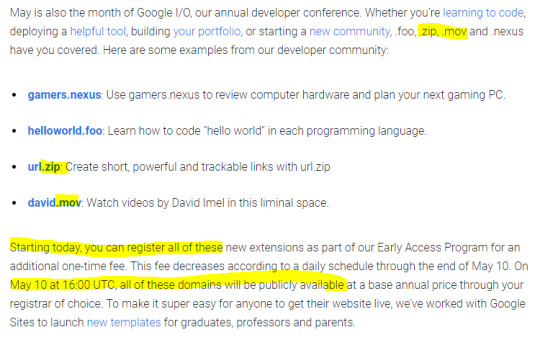
This means typing out a file name could resolve into a link that takes you to one of these new URLs, whether it's in an email, on your tumblr blog post, a tweet, or in file explorer on your desktop.
What was previously plain text could now resolve as link and go to a malicious website where people are expecting to go to a file and therefore download malware without realizing it.
Folk monitoring these new domain registrations are already seeing some clearly malicious actors registering and setting this up. Some are squatting the domain names trying to point out what a bad idea this was. Some already trying to steal your login in credentials and personal info.
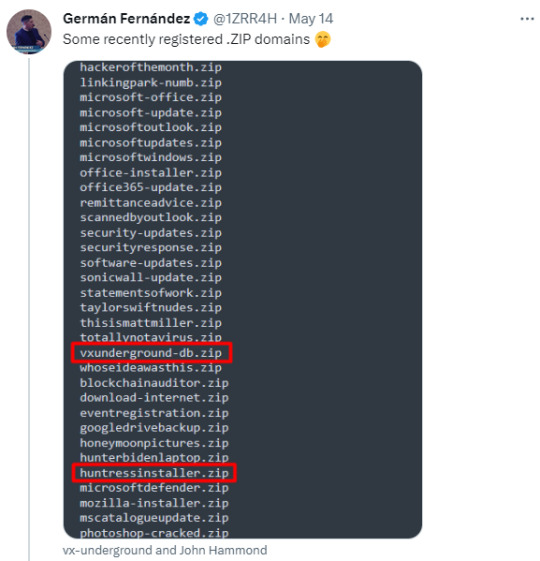
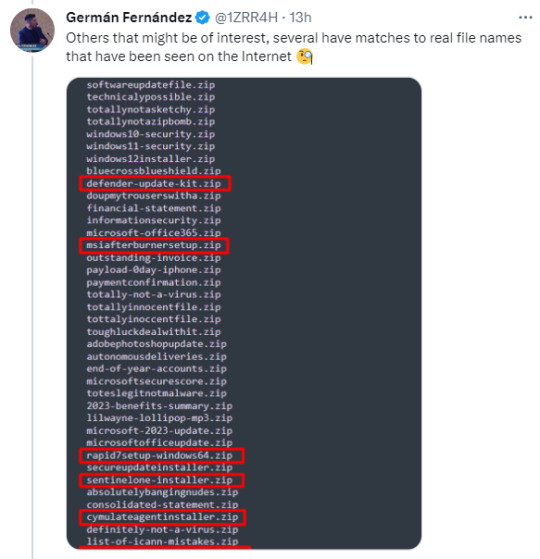
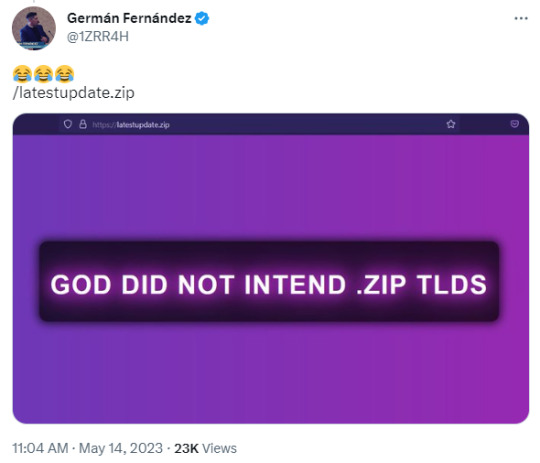
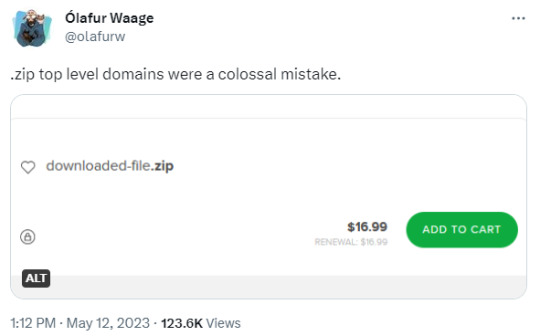
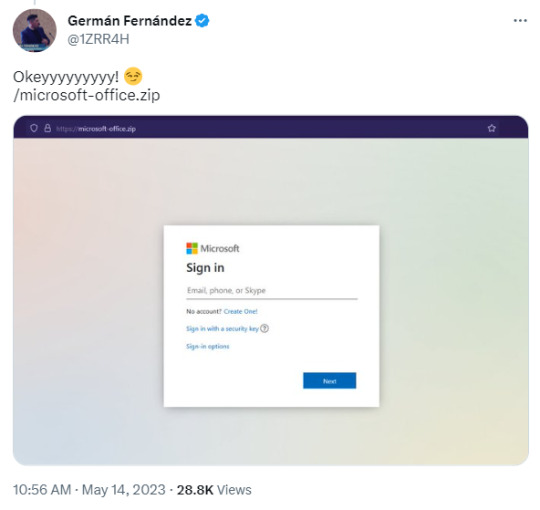
This is what we're seeing only 12 days into the domains being available. Only 5 days being publicly available.
What can you do? For now, be very careful where you type in .zip or .mov, watch what website URLs you're on, don't enable automatic downloads, be very careful when visiting any site on these new domains, and do not type in file names without spaces or other interrupters.
I'm seeing security officers for companies talking about wholesale blocking .zip and .mov domains from within the company's internet, and that's probably wise.
Be cautious out there.
#tech#google#domain names#the more you know#zip#.zip#mov#.mov#yikes#BIG FUCKING YIKES#WHO THOUGHT THIS WAS AGOOD IDEA HOLY SHIT ARE YOU A FOOL
72K notes
·
View notes
Text
You Have until June To Dump Chrome
Google has announced that starting in June 2024, ad blockers such as uBlock Origin will be disabled in Chrome 127 and later with the rollout of Manifest V3 (#Mv3).
Firefox is RIGHT there
35K notes
·
View notes
Text
hey, so people need to be aware that youtube is now (randomly) holding basic features for ransom (such as being able to pin comments under your own videos) in exchange for Your State ID/Drivers License, or a 30 Second Video Of Your Face.
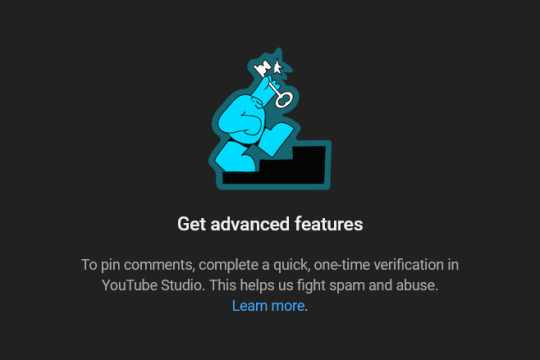
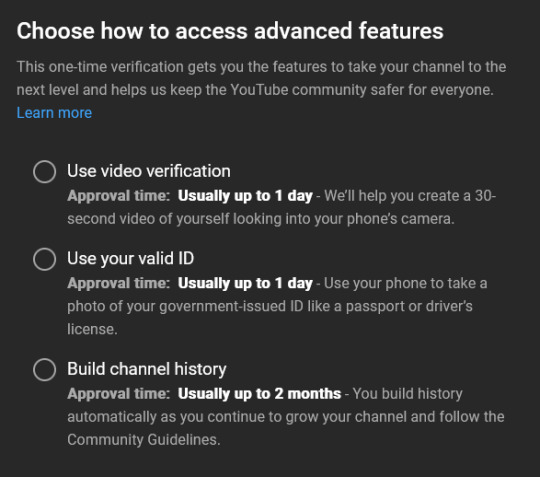
not to pull a "think of the children," but No Actually.
I've been making videos as a hobby since 2015 (and I've had my channel since middle school), I was a minor when I started and I'm not sure I would have understood the kind of damage something a seemingly simple as a video of your face can do.
this is a Massive breach of privacy and over-reach on google's part No Matter What, but if they're going to randomly demand a state ID or license then they absolutely should not allow minors to be creators.
google having a stockpile of identifying information on teenagers is bad enough, but the Alternative of recording your face and handing it over to be filed away is Alarming considering it opens the gates for minors who Aren't old enough to have a license.
and yes, there is a third option, but it's intentionally obtuse.
a long wait period (2 months), with no guarantee of access (unlike, say, the convenience of using your phone's cameras for either of the other two), with absolutely No elaboration on what the criteria is or how it's being measured.
it's the same psychological effect that mobile games rely on. offer a slow, unreliable solution with no payment to make the Paid instant gratification look more appealing (the "payment" in this case being You. you are the product being offered).
and it's Particularly a system that (I think intentionally) disadvantages people who don't treat their channels like a job. hobbyists or niche creators who don't create regularly enough or aren't popular enough to meet whatever Vague criteria needs to be met to pass.
markiplier would have no problem passing, your little brother might not be able to. and while Mark's name is already out there there's no reason why your little brother's should be too.
something like pinned comments may seem simple, you don't technically Need it. but it's a feature that's been available for years. most people don't look at descriptions anymore. so when there's relevant information that needs to be delivered then the pinned comment is usually the go to.
for my little channel that information is about the niche series I create for. guides on how to get into the series, sources on where to find the content At All (and reliably so). for other creators it can be used for things Much More Important.
Moreover, if we let them get away with cutting away "small" features and selling it back to you for the price of your privacy, then they Will creep further. they Will take more.
Note: I have an update to this post here: [Link]
#enshittification#discourse#youtube#google#evillious chronicles#evillious#ec#this isn't overtly About that fandom#but it is#because it affects how I'm able to run my channel going forwards#I have no clue if I'm going to pass whatever 'test' they're giving my channel#so it's possible there won't be any pinned comments under the tobimisa channel ever again#I won't be able to edit old ones either#as that unpins the comment#which I won't be able to pin again
33K notes
·
View notes
Text
well we're uninstalling duolingo great job everyone I'll be in duo's basement if anyone needs me
#I FORGOT TO TURN NOTIFICATIONS BACK ON AFTER I REINSTALLED DUOLINGO AFTER RAGE DELETING IT#IT'S OKAY IT MEANS I'M FREE#besides I'm already learning another language right now it's okay#google is the best search engine#google posting#google#duo my adopted child
34 notes
·
View notes
Text

More affluent older white people jeering and making a mockery of this young person who refuses to be complacent in Google's complicity in the ongoing genocide against Palestinian people. The raw materials used to make their products also depend on exploiting Congolese people -including young children, who mine for cobalt. Google, Apple -any company that relies on suffering, destruction, and death of ANY community around the world needs to be stopped. Keep boycotting. Keep speaking up about these injustices.
#feminist#social justice#free palestine#palestine#free gaza#current events#settler colonialism#settler violence#free congo#congo genocide#dr congo#congo#congo is bleeding#boycott#boycotting#us imperialism#western imperialism#global news#google#big tech#protest
14K notes
·
View notes
Text
Their silence says a lot

Edit: youtube definitely wrote that half-assed apology for her. She doesn't regret a thing they just didn't wanna punish her so they made her post the apology they obviously wrote
"i wanna thank youtube for holding me accountable" 💀💀💀
Edit 2: I just saw youtube's tweet "the behavior from BOTH creators isn't what we want on yt"...
Are you SERIOUS?! what did he do wrong?? Call out a content thief?!
Edit 3: just found out that Jack has been making videos on yt for 17 years! Since 2006 which is one year after youtube was launched...
He was one of the FIRST creators on yt and after all these years him and his safety meant absolutely nothing to them
19K notes
·
View notes
Text
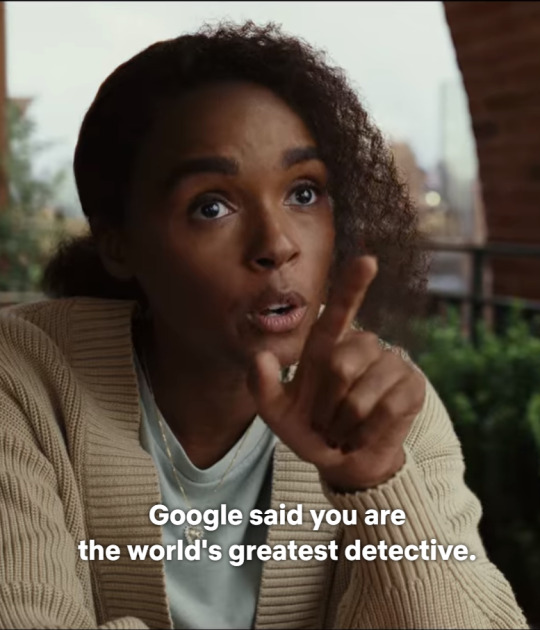
Actual Google results for “World’s Greatest Detective”:
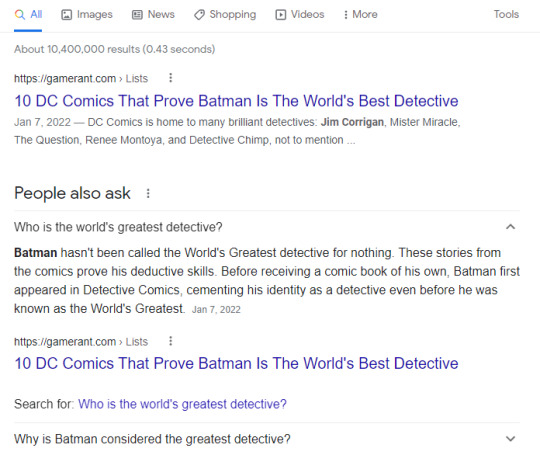

#glass onion#daniel craig#benoit blanc#rian johnson#knives out#batman#world's greatest detective#janelle monae#helen brand#cassandra brand#google#google search#detective
69K notes
·
View notes
Text
Google is going to start scraping all of their platforms to use for AI training. So, here are some alternatives for common Google tools!
Google Chrome -> Firefox
If you’re on tumblr, you’ve probably already been told this a thousand times. But FireFox is an open-source browser which is safe, fast and secure. Basically all other browsers are Chrome reskins. Try Firefox Profilemaker, Arkenfox and Librewolf! Alternatively, vanilla Firefox is alright, but get Ublock Origin, turn off pocket, and get Tabliss.
Google Search -> DuckDuckGo
DuckDuckGo very rarely tracks or stores your browsing data (though they have only been known to sell this info to Microsoft). Don’t use their browser; only their search engine. Domain visits in their browser get shared. Alternatively, you can also use Ecosia, which is a safe search engine that uses its income to plant trees! 🌲
Google Reverse Image Search -> Tineye
Tineye uses image identification tech rather than keywords, metadata or watermarks to find you the source of your image!
Gmail -> ProtonMail
All data stored on ProtonMail is encrypted, and it boasts self-destructing emails, text search, and a commitment to user privacy. Tutanota is also a good alternative!
Google Docs -> LibreOffice
LibreOffice is free and open-source software, which includes functions like writing, spreadsheets, presentations, graphics, formula editing and more.
Google Translate -> DeepL
DeepL is notable for its accuracy of translation, and is much better that Google Translate in this regard. It does cost money for unlimited usage, but it will let you translate 500,000 characters per month for free. If this is a dealbreaker, consider checking out the iTranslate app.
Google Forms -> ClickUp
ClickUp comes with a built-in form view, and also has a documents feature, which could make it a good option to take out two birds with one stone.
Google Drive -> Mega
Mega offers a better encryption method than Google Drive, which means it’s more secure.
YouTube -> PeerTube
YouTube is the most difficult to account for, because it has a functional monopoly on long-form video-sharing. That being said, PeerTube is open-source and decentralized. The Internet Archive also has a video section!
However, if you still want access to YouTube’s library, check out NewPipe and LibreTube! NewPipe scrapes YouTube’s API so you can watch YouTube videos without Google collecting your info. LibreTube does the same thing, but instead of using YouTube servers, it uses piped servers, so Google doesn’t even get your IP address. Both of these are free, don’t require sign-ins, and are open source!
Please feel free to drop your favorite alternatives to Google-owned products, too! And, if this topic interests you, consider checking out Glaze as well! It alters your artwork and photos so that it’s more difficult to use to train AI with! ⭐️
#anti ai#anti ai art#anti ai music#anti ai writing#anti google#google#political#current events#azure does a thing
29K notes
·
View notes